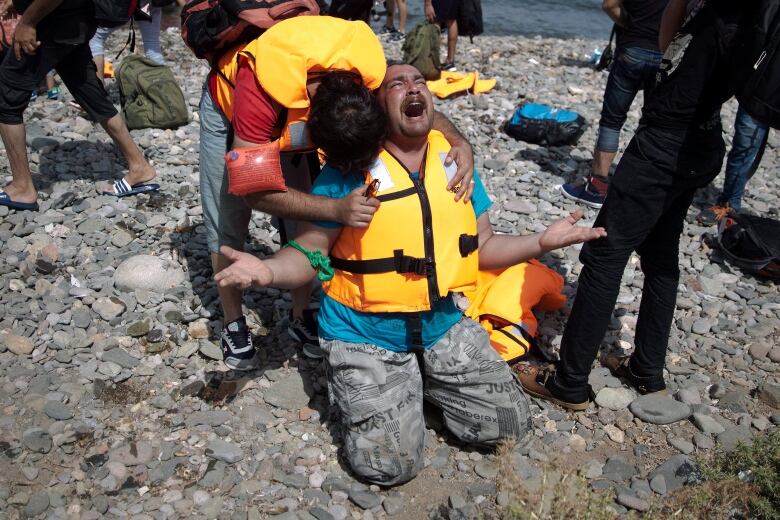Refugee crisis: Nerves fray among those stranded on Greek island of Lesbos
20,000 migrants and refugees have recently landed, mostly from Syria, Iraq and Afghanistan
It was supposed to be the first step on their journey to Western Europe. But now thousands ofrefugeesare mired in despair, anger and frustration on the scenic Greek island ofLesbos.
After perilous sea voyages from neighbouring Turkey, they have been stranded here for days, some for nearly two weeks, running out of money and desperate to get to mainland Greece and continue their route.
The island of some 100,000 residents has been transformed by the sudden new population of some 20,000 refugees and migrants, mostly from Syria, Iraq and Afghanistan and the strain is pushing everyone to the limit.
- Refugee crisis: Angela Merkel says EU must share burden of refugee influx
- How Canadians can help Syrian refugees
- Syria's civil war: 6 things to know from this summer
Fights break out among the migrants as they wait in long lines for hoursin the summer heat and humidity, after days without showers. Families, sleeping on the streets, wander the seaside promenade of Mytilene,Lesbos' capital, asking at the swanky cafes and restaurants to use their bathrooms or charge phones. The small police force, overwhelmed by the numbers, charges in at any sign of trouble, beating crowds with batons to break them up.
"We escaped from ruin to be met with more ruin here," said Mohammed Salama, a 45-year-old Syrian. He fled the Damascus suburbs where fighting has raged for years, seeking a refuge so he can bring his four daughters and pregnant wife who remained behind.
"I did not come here to make money," he said Sunday. "I came here so I can later bring my children and have them live in safety."
Brawls break out as refugees line up for hours
Lesbosis one of several Greek islands hugging the Turkish coast that are the first stop for many of those trying to reach Western Europe. Here, they must register with police and receive an official document. Without that document, they can't buy a ferry ticket to the mainland to continue on land through the Balkans.
But the registration offices are swamped, slowing everything down. Under the punishing sun in high humidity, hundreds crowd outside the offices for hours.
Brawls break out frequently among the hot, exhausted crowds, often met by police swinging batons and shouting, "Pisso!" Greek for "go away."
Lesbosresidents lash out in fury, disgust
The nerves ofLesbosresidents as well are fraying.

"I want them out of here, but it's not because I hate them. It's because we see so much suffering and we are unable to help them in any meaningful way," said Pandelis, a resident who wanted to be identified only by his first name.
The signs of residents' impatience come in many ways. Drivers blast their horns in fury at migrants walking in the middle of the streets by Mytilene's port. Some passers-by roll their eyes disapprovingly. Many put on surgical masks when they pass through the area, convinced the new arrivals are bringing disease. On Saturday, two elderly men walked among the overwhelmingly Muslim migrants handing out copies of the Bible in Arabic.
Others complain about the litter bottles, plastic bags and cardboard thrown into the sea and covering the streets around the port.
Religion, class and nationality divide refugees
Among the refugees and migrants, confusion reigns. Lines suddenly form and people rush to join them and wait for hours, only to discover the line was sparked by a rumour and they were waiting for nothing.
The national, class and sectarian divisions show. Most of the Afghans are impoverished men in their 20s, while the Syrians and Iraqis include families and the middle class and they complain often about the Afghan youth pushing their way to the front of lines. It doesn't help that most of the Afghans are from their country's Shiaminority, a point several of the mainly Sunni Muslim Syrians, coming from a bloody war with sectarian overtones, bitterly mentioned.
#Refugees arriving on the coast of Lesvos from Turkey this morning. Mostly people from Syria and Afghanistan. #CBC pic.twitter.com/pVpKXAXwHY
—@mevansCBCThe migrants' day begins at sunrise, as they converge on the registration offices, hopeful that today they will finish. But the day drags on with lines, scuffles, confusion and exhaustion and despair set in.Two or three times a day, a ferry arrives, and those who have gotten their documents and bought tickets rush to the port. Each ferry carries about 2,000 people to the port of Piraeus near Athens.
'God curse the line'
In the evening, those still waiting search the streets for pieces of cardboard to sleep on. Camps have been set up outside Mytilene, but few want to use them because they want to stay near the port.
Baraah,a 40-year-old Syrian widow travelling with her three teenage children and her late husband's sister, left Aleppo so her children would be safe but says she wasn't prepared for this kind of hardship. They havebeen stuck inLesbosfor 10 days, their money running out, sleeping on the sidewalk by the port for their chance at the paper.
On Sunday morning, Baraahturned to a passing Syrian woman and asked, "How is the line?"
"God curse the line and the line's father," the woman snapped before rushing away.












_(720p).jpg)


 OFFICIAL HD MUSIC VIDEO.jpg)
.jpg)



























































































